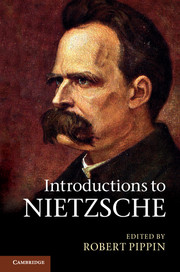Book contents
- Frontmatter
- Contents
- Note to the reader
- Chronology of Nietzsche's life and works
- Introduction
- Chapter 1 Nietzsche: Writings from the early notebooks
- Chapter 2 Nietzsche: The Birth of Tragedy
- Chapter 3 Nietzsche: Untimely Meditations
- Chapter 4 Nietzsche: Human, All Too Human
- Chapter 5 Nietzsche: Daybreak
- Chapter 6 Nietzsche: The Gay Science
- Chapter 7 Nietzsche: Thus Spoke Zarathustra
- Chapter 8 Nietzsche: Beyond Good and Evil
- Chapter 9 Nietzsche: On the Genealogy of Morality
- Chapter 10 Nietzsche: The Anti-Christ, Ecce Homo, Twilight of the Idols
- Chapter 11 Nietzsche: Writings from the late notebooks
- Select bibliography
- Index
- References
Chapter 2 - Nietzsche: The Birth of Tragedy
Published online by Cambridge University Press: 05 June 2012
- Frontmatter
- Contents
- Note to the reader
- Chronology of Nietzsche's life and works
- Introduction
- Chapter 1 Nietzsche: Writings from the early notebooks
- Chapter 2 Nietzsche: The Birth of Tragedy
- Chapter 3 Nietzsche: Untimely Meditations
- Chapter 4 Nietzsche: Human, All Too Human
- Chapter 5 Nietzsche: Daybreak
- Chapter 6 Nietzsche: The Gay Science
- Chapter 7 Nietzsche: Thus Spoke Zarathustra
- Chapter 8 Nietzsche: Beyond Good and Evil
- Chapter 9 Nietzsche: On the Genealogy of Morality
- Chapter 10 Nietzsche: The Anti-Christ, Ecce Homo, Twilight of the Idols
- Chapter 11 Nietzsche: Writings from the late notebooks
- Select bibliography
- Index
- References
Summary
Cosima Wagner's thirty-third birthday, her first since she and Wagner had married, fell on 25 December 1870. Wagner's present to her was the newly composed ‘Siegfried Idyll’. He secretly arranged for a small group of musicians to assemble in the morning on the stairs outside her bedroom and they began to play as she awoke. One of the guests present at this performance was the newly appointed 26-year-old Professor of Classical Philology at the University of Basel, Friedrich Nietzsche. Nietzsche was an ardent admirer of Wagner's music, and he and Wagner shared an enthusiasm for the philosophical pessimism of Arthur Schopenhauer. The world as we know it, Schopenhauer thought, the world of objects in space and time held together by relations of cause and effect, was nothing but a representation, an illusion generated by the unending play of a metaphysical entity which he called ‘the Will’. This Will, the underlying reality of the world, expressed itself in a variety of ways in the human world, most keenly in the form of sexual desire; it had each human individual in its grip and drove each of us on to forms of action that inevitably ended either in disgusting satiation or in frustration. The very nature of the universe precluded the possibility of any continuing human happiness. The best we could hope for, Schopenhauer argued, was momentary respite from the continual flux of willing and frustration through the contemplation of art. Aesthetic experience could have this effect because it is radically disinterested and thus extracts us from the world of willing. Music, in particular, is inherently non-representational, and Schopenhauer draws from this fact the stunning conclusion that music both gives us virtually direct access to ultimate reality, and is also one of the best ways available to us of distancing ourselves from the relentless throb of the Will.
Keywords
- Type
- Chapter
- Information
- Introductions to Nietzsche , pp. 44 - 66Publisher: Cambridge University PressPrint publication year: 2012
References
- 2
- Cited by

